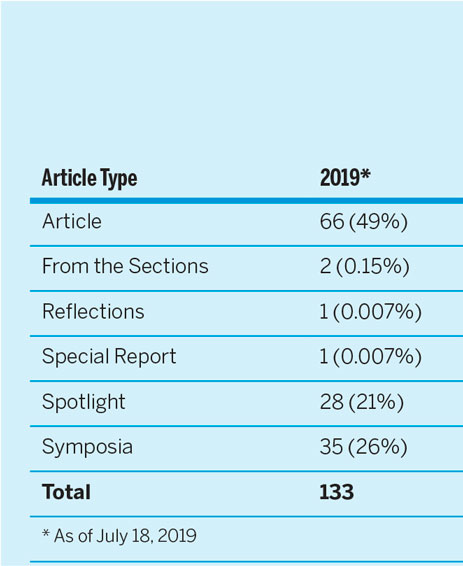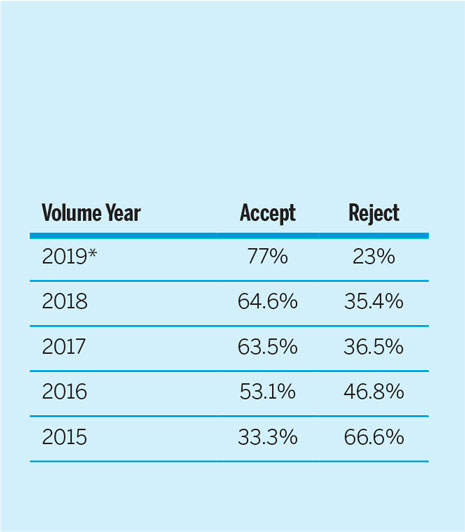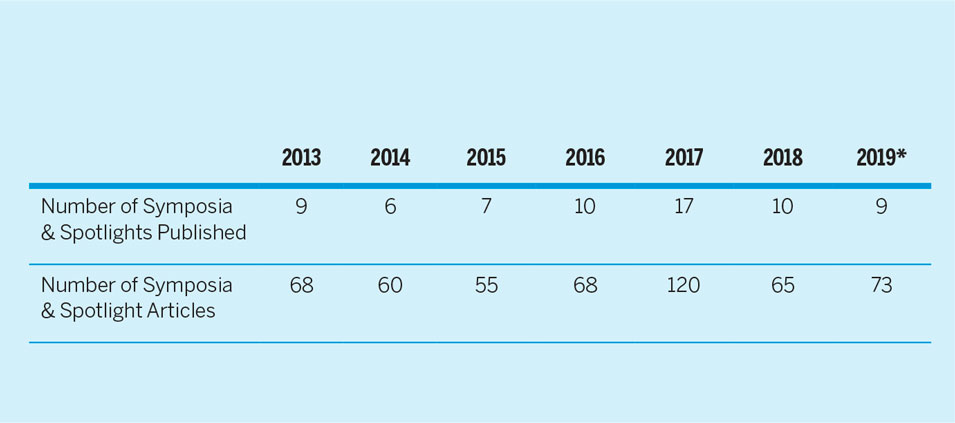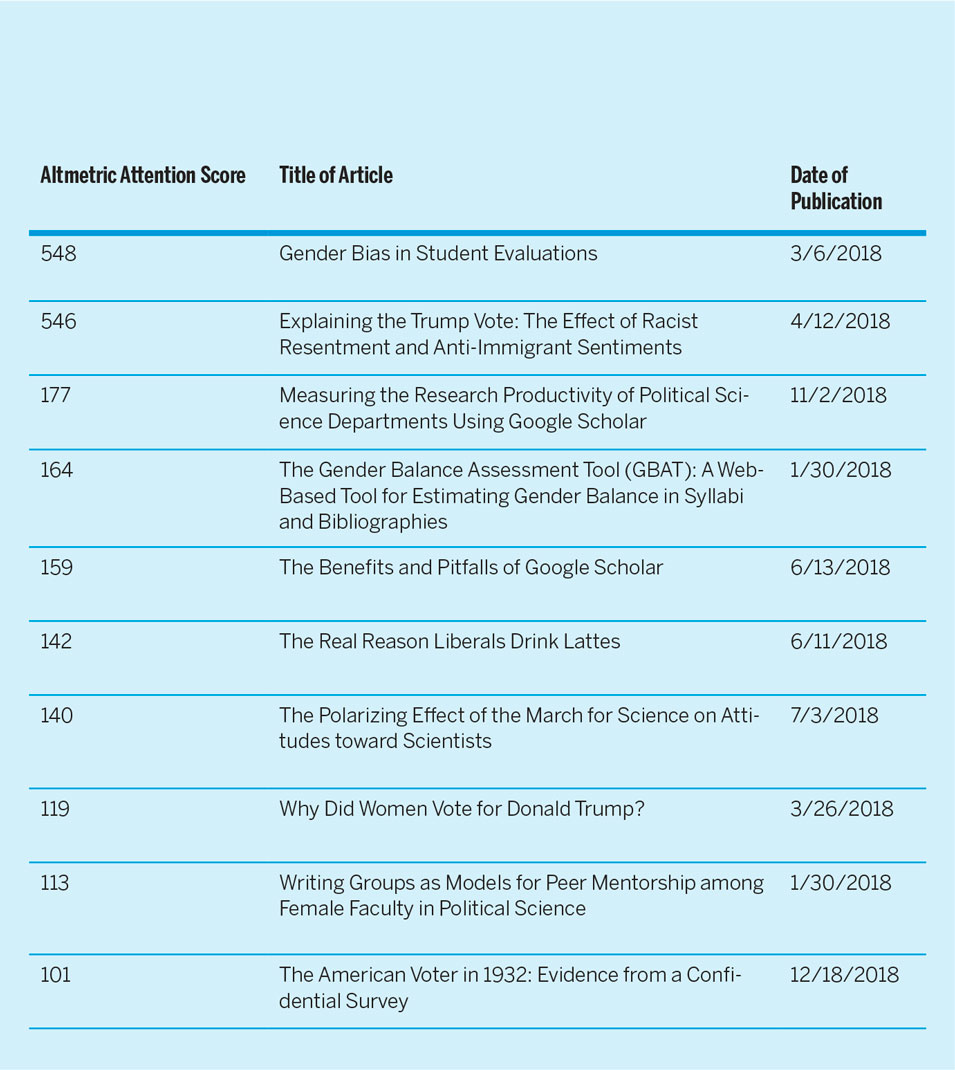PS: Political Science & Politics is in its 52nd year of publication. The editorial team strives to maintain the particular niche that PS occupies among the APSA portfolio of publications as an outlet for brief and non-technical articles featuring new research, political science commentary and research on timely political and social events, research into and discussion of the political science discipline, and scholarship on teaching and pedagogy.
As we enter the fifth year of our editorship, we have turned our attention from stewarding the journal as it transitioned from an in-house publication to one edited by an academic team. As we enter the last three years of what will be a seven-year stint as editors, we are working to systematize and document our editorial policies and procedures so that our successors will have an easier time handling the editorial transition.
We have begun to make headway this year in attracting more submissions from international scholars and featuring articles that address the concerns of contingent scholars. These are topic areas we hope to pursue in the upcoming year.
PS functions as something of a megaphone to the discipline, and we feel an important sense of responsibility to anticipate and elevate important discussions about equity, diversity, and the public profile of our discipline. This is clear from a table of our most read and shared articles (based on Altimetric scores) for the last two years, reported below. Our most impactful articles deal with gender and other diversity issues in the profession, process tracing and other methodology, and disciplinary impact and influence.
We have made special efforts this year—in collaboration with the Publications Policy Committee, the Executive Director, and the Director of Publishing—to assure that our process for soliciting, reviewing, and processing symposium submissions provides equal access to all voices in our discipline. We have navigated some challenges this year with our special focus symposia. In response, we are making some changes to the submission process for symposia, subjecting all proposals to outside peer review, and tightening editorial control over the final product. We hope these measures address some of the concerns raised about the balance of competing voices that appeared in our pages this year. We want to thank Christina Wolbrecht (Chair of the Publications Policy Committee) and Jon Gurstelle, Director of Publishing, for helping in this process.
Table 1 New Submissions to PS

* As of July 18, 2019
Political science is somewhat unique among academic disciplines because we cannot turn away from a turbulent political world, and some of this turbulence will inevitably spill onto our pages. We urge anyone who has comments, suggestions, and criticisms to forward these to the editorial team at ps@apsanet.org.
EDITORIAL HIGHLIGHTS OF 2018-19
As shown in table 1, submission rates to PS have grown by 75-100% since we took over as editors in fall of 2014. We appear to have levelled out to 175-200 submissions annually. We have had no difficulties filling our allocation of pages from Cambridge University Press.
Additional publication highlights from the past year include:
• Kim, Hannah June, and Bernard Grofman. 2019. “The Political Science 400: With Citation Counts by Cohort, Gender, and Subfield.” 52 (2): 296–311.
• Weyland, Kurt, ed. 2019. “Promotion Letters: Current Problems and a Reform Proposal.” 52 (2): 332–36.
• Clucas, Richard, ed. 2019. “State Legislatures at 400.” 52 (3): 413–16.
• Getmansky, Anna, and Mark Tessler, eds. 2019. “Reflections on Scholarship and Fieldwork in the Middle East and North Africa.” 52 (3): 481–84.
• Cszastkiewicz, Veronica M., and Susan Orr, eds. 2019. “Empowering Contingent Faculty: Perspectives, Strategies, and Ideas.” 52 (3): 513–26.
• Rom, Mark Carl, ed. 2019. “Does Political Science Lack Diversity? Ideologically, That Is.” 52 (4): 1–5.
Symposia and articles on gender and diversity in the discipline include:
• Djupe, Paul A., Amy Erica Smith, and Anand Edward Sokhey. 2019. “Explaining Gender in the Journals: How Submission Practices Affect Publication Patterns in Political Science.” 52 (1): 71–77.
• Reid, Rebecca A. and Todd A. Curry. 2019. “Are We There Yet? Addressing Diversity in Political Science Subfields.” 52 (1): 281–86.
• Cox Han, Lori, and Caroline Heldman. 2019. “Teaching Women/Gender and Politics: Current Trends and Challenges.” 52 (3): 531–35.
• Goodman, Sara Wallace, and Thomas B. Pepinsky. 2019. “Gender Representation and Strategies for Panel Diversity: Lessons from the APSA Annual Meeting.” 52 (4): 1–8.
• Htun, Mala. 2019. “Promoting Diversity and Inclusion through Engagement: The APSA 2018 Hackathon.” 52 (4): 1–7.
• Key, Ellen M, and Jane Lawrence Sumner. 2019. “You Research Like a Girl: Gendered Research Agendas and Their Implications.” 52 (4): 1-6.
• Yanus, Alixandra B. 2019. “Learning to ‘Play the Game as Men Do’: How the General Federation of Women’s Clubs Brough Political Science to Women.” 52 (4): 1–4.
Table 2 PS Submissions by Article Type

* As of July 18, 2019
STAFFING AND EDITORIAL BOARD
The PS: Political Science & Politics staff consists of a portion of two editors’ time and a full-time managing editor as well as a part-time editorial associate. Co-editor Phillip Ardoin is based at Appalachian State University in Boone, North Carolina and co-editor Paul Gronke is based at Reed College in Portland, Oregon. Celina Szymanski, senior managing editor, is based in Las Vegas, Nevada. Nicholas Townsend, publishing associate, was based at APSA headquarters in Washington, DC and served as a liaison between official APSA news and events and the journal through July 1, 2019. As of July 22, 2019, Henry Chen is the APSA publishing associate. PS is further supported by part-time student assistants at both Appalachian State and Reed College.
Our current editorial board includes 26 scholars who represent a diverse set of universities and colleges, research interests, methodologies, and perspectives of the APSA membership. We would like to thank the members of our editorial board for their dedication and service to the journal and the profession.
New Board Members:
• Justin Esarey, Wake Forest University
• Kevin Esterling, University of California, Riverside
• Brett Ashley Leeds, Rice University
• Yalidy Matos, Rutgers University, New Brunswick
• Barbara Norrander, University of Arizona
• Joseph Roberts, Roger Williams University
• Laura Sjoberg, University of Florida
• Dawn Teele, University of Pennsylvania
• Renee Van Vechten, University of Redlands
Continuing Board Members:
• Michelle Deardorff, University of Tennessee at Chattanooga
• Maryam Zarnegar Deloffre, Temple University
• Johnny Goldfinger, Marian University
• Kristin Goss, Duke University
• Robert Griffin, Democracy Fund
• Robert Hogan, Louisiana State University
• DuBose Kapeluck, The Citadel
• Mary Meyer, Eckerd College
• Kristin Michelitch, Vanderbilt University
• Sara McLaughlin Mitchell, University of Iowa
• Mason Moseley, West Virginia University
• Mark Carl Rom, Georgetown University
• Bartholomew Sparrow, University of Texas at Austin
• Mary A. Stegmaier, University of Missouri
• Jonathan Strand, University of Nevada, Las Vegas
• Joel Westheimer, University of Ottawa
• Leonard Williams, Manchester University
We want to thank the following editorial board members, whose term of service ends at the 2019 APSA Annual Meeting, for their service, time, and dedication to PS.
• Jeffrey Bernstein, Eastern Michigan University
• Michelle Brophy-Baermann, Rhode Island College
• Mary Durfee, Michigan Tech
• John Ishiyama, University of North Texas
• Samantha Majic, John Jay College of Criminal Justice
• Elizabeth K. Markovits, Mount Holyoke College
• Brent Steele, University of Utah
• Charles R. Venator Santiago, University of Connecticut
Table 3 Final Disposition on Submissions, by date of final decision

* As of July 18, 2019
PUBLICITY AND OUTREACH
PS joined the Twitterverse in January 2018. We now have about 1,300 followers and are steadily building a follower base. Our handle is @ps_polisci. A typical tweet involves a catchy phrase or sentence describing the work and a link to the article itself. Often, authors of the featured article will provide the tweet for us to use on their behalf. We try to tag (@) authors who are active on Twitter to increase exposure and allow the authors to retweet the link. The APSA editorial associate runs the PS-Twitter, in consultation with the managing editor. Table 5 lists articles published in 2018 with the 10 highest Altmetric scores.
The APSA-run Political Science Now blog (www.politicalsciencenow.com) continues to feature PS content. It is especially useful in promoting symposia and spotlights. PS articles continue to be featured is news media and other publications including Inside Higher Ed, The Washington Post’s Monkey Cage, and National Public Radio, among others.
Table 4 Symposia and Spotlights Published in PS

* As of July 18, 2019
Table 5 List of Top 10 Altmetric Scores for Articles Published in 2018








